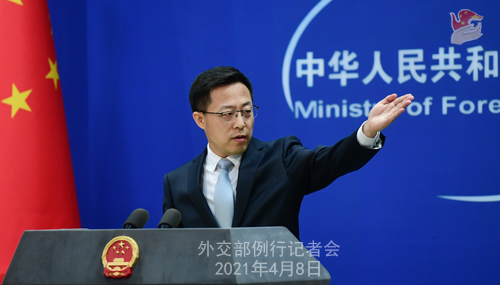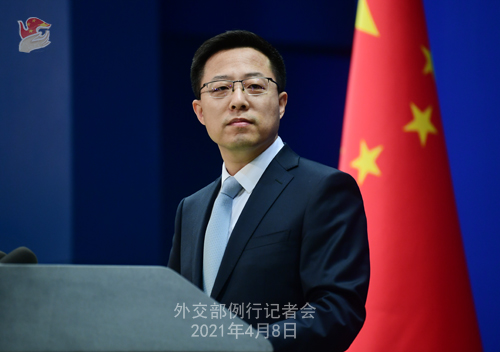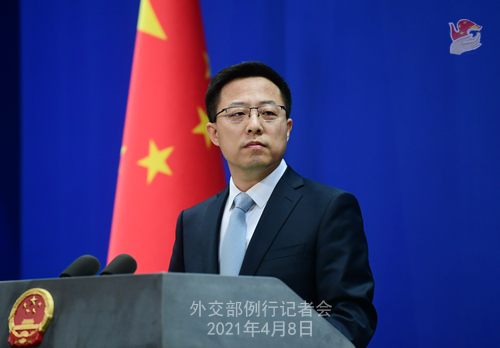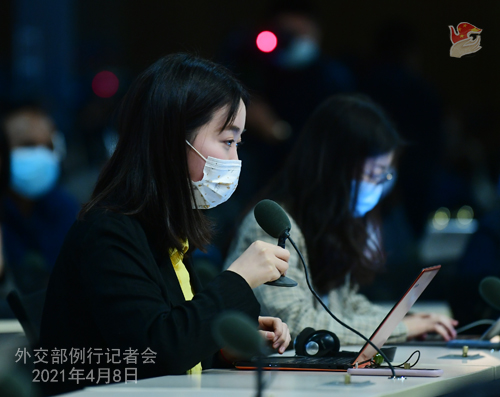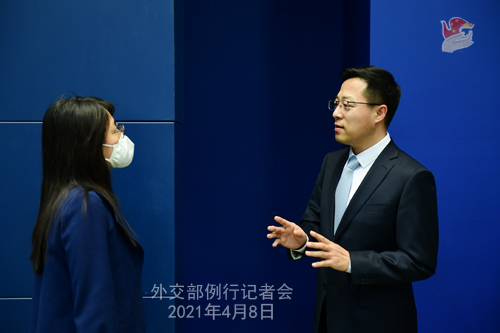| Foreign Ministry Spokesperson Zhao Lijian's Regular Press Conference on April 8, 2021 |
| 2021-04-08 21:55 |
|
RIA Novosti: According to media reports, a construction site in southeastern Nigeria was attacked by unidentified militants. Two Chinese citizens were kidnapped. Could you confirm and give us some details on what measures have been taken? Is there any plan to evacuate Chinese nationals and diplomats in Nigeria? What steps will be taken to protect them? Zhao Lijian: On April 5 local time, two Chinese employees of a Chinese funded enterprise in Osun state, Nigeria, were kidnapped. Upon learning of it, the Chinese consulate general in Lagos immediately activated emergency response mechanism, urging the Nigerian police to rescue the hostages and ensure their safety, and guiding the enterprise involved to deal with the situation properly. We have a number of projects and Chinese funded enterprises in Nigeria, even though the local security situation has never been ideal. We will not resort to evacuation because of some occasional individual cases. Prasar Bharati: It's going to be around two months since the first round of troops disengagement happened between India and China at the border. Also, it's going to be a month since last talks took place for troops disengagement at other friction areas at the Ladakh border. Can you please share any update as to when the next round of talks is likely to take place and any particular reason for the delay in the talks and the disengagement at the Ladakh areas? Zhao Lijian: China and India are in contact with each other regarding the 11th round of commander-level talks. There is no such thing as delay in talks as you mentioned. I'd like to stress that the ins and outs of the China-India border issue are very clear. The responsibility does not rest with China. It is hoped that India will meet with China half way, earnestly implement the important consensus reached by the leaders of the two countries, strictly abide by the agreements signed by the two sides, and take concrete actions to further ease the border situation.
HRTN: Today is a special day for Wuhan. At 12 a.m. on April 8, 2020, after 76 days of lockdown, Wuhan lifted outbound transport restrictions. What's the foreign ministry's comment on this? Zhao Lijian: Today marks the first anniversary of the lifting of lockdown in Wuhan, Hubei Province. The heroic people in Wuhan and Hubei, bearing in mind the greater good, made enormous sacrifice for a national victory over COVID-19 and contributed significantly to the global COVID-19 response. With their concrete efforts day in and day out, the people in Wuhan have demonstrated China's strength and spirit as well as the Chinese people's sense of responsibility to the country as they strove to tide over difficulties in solidarity. Over the past year, Wuhan has emerged stronger from the most trying of times. As its economy bounces back, fresh vigor and vitality is felt in every corner of the city. I read from reports that by the end of last year, Wuhan's annual economic aggregate had enable the city to resume its previous ranking as one of the top ten cities in China. Some media use keywords such as end of lockdown, going back to work, revitalizing, facial masks, health code, "cloud life" and vaccines to record the days when this city, known for its hot-dry noodles with sesame paste, made strenuous efforts to get its life back to normal in the past year. What Wuhan and Hubei have experienced is the epitome of China's extraordinary journey of fighting the epidemic. The recovery of Wuhan also adds strength and confidence to the global fight against the epidemic. After COVID-19 broke out, the Ministry of Foreign Affairs, leveraging its unique strength, sent out a working group to Wuhan to coordinate efforts involving foreign countries like sourcing anti-epidemic supplies for Hubei, receiving international assistance and arranging charter flights. Fighting shoulder to shoulder with the heroic people of Hubei, the ministry made its contribution to winning the battle of defense in Wuhan and Hubei. Now, economic and social activities have been basically restored to normal in Hubei. The Ministry of Foreign Affairs will once again draw on its advantages and help boost Hubei's post-COVID development. Yesterday, we announced that a special promotion event for Hubei will be held on April 12 to present to the world a province reborn for new glories and help build new bridges of cooperation linking Hubei to the world. It will mark the resumption of our promotion events in post-COVID time, and will also be the first time for the ministry to promote the same province twice. As we mark the first anniversary of the lifting of lockdown in Wuhan, let's give our best wishes for an even better tomorrow for Wuhan and Hubei. Welcome to visit Wuhan to try its famous hot-dry noodles with sesame paste and enjoy the view up from the Yellow Crane Tower. Global Times: According to media reports, 24 scientists and researchers from Europe, the United States, Australia and Japan said in an open letter that the joint China-WHO study into COVID-19 has provided no credible answers about how the pandemic began, and that the study was tainted by politics. Jamie Metzl, senior fellow at the Atlantic Council think tank, who drafted the letter, said that "China has databases of what viruses were being held... there are lab notes of the work that was being done...there are all kinds of scientists who are actually doing the work and we don't have access to any of those resources, or any of those people". He said China should disclose information that would allow the lab hypothesis to be disproved. I wonder if China has any comment on that? Zhao Lijian: This reminds me of the previous so-called "open letter of scientists" that came out on March 4. It was also drafted by Jamie Metzl, a former member of the White House National Security Council and signed by almost the same group of people. The purpose of these two so-called open letters, one issued right before the WHO joint study report was to be made public and the other shortly after the report was released, is obviously to mount pressure on the WHO and the joint mission. These signatories can deceive no one as to whether their letters are meant to make a true proposal for scientific and professional origin-tracing or target a specific country with presumption of guilt. The Chinese side has provided an abundance of manpower and material support to the joint mission for its origin-tracing study in China. We fully respect and have made every effort to meet the requests independently put forward by the mission as to the places they would like to see. China's openness and transparency is well commended by the mission. The origin-tracing study was indeed affected by political factors, but that did not come from China, but from the United States and some other countries, who are bent on politicizing the origin-tracing issue in an attempt to disrupt China's cooperation with WHO and discredit China. By blatantly questioning the independence and research conclusions of real scientists, they will not only cripple international cooperation on origin tracing, but also undercut global anti-epidemic efforts. As for the lab hypothesis, experts on the mission all agreed that lab leaking is extremely unlikely, after visiting disease control centers in Hubei and Wuhan, the Wuhan Institute of Virology and various biosafety labs, and after having in-depth, frank and science-based exchanges with their Chinese peers from relevant research institutions. That said, if clues and evidence are found in other parts of the world, that will be quite another matter. We hope that all parties concerned, including the United States, will adopt the same attitude of science-based cooperation as China, carry out origin-tracing cooperation with WHO, and invite WHO experts for origin-tracing study in their own countries. I noticed that Russia recently expressed concern once again over the bio-military activities by the US on its own territory including at Fort Detrick and in other countries like Ukraine. This concern is actually shared by many other countries. As China has said repeatedly, relevant US activities are not transparent, safe or justified. We may take Ukraine for example, which was mentioned by the Russian side. According to openly available reports, the US has set up 16 bio-labs in Ukraine alone. Why does it need to build so many labs all over the world? What activities has the US military been conducting in these labs and the base at Fort Detrick? Why does the US stand alone in opposing the establishment of a verification mechanism under the Biological Weapons Convention? Could it be that there are places within these labs and base where the US dare not allow in international verification? We once again call on the US to adopt a responsible attitude, earnestly respond to international concerns, offer a full clarification on its bio-military activities at home and abroad, and stop obstructing the establishment of a verification mechanism under the Biological Weapons Convention.
Prasa Bharati: You mentioned about the 11th round of talk between the two countries. Is there any date finalized for this talk? You said that the responsibility lies with India, so India has stated its position that both countries should restore the status quo of 2020. Will China consider this proposal by India in this regard? Zhao Lijian: I have no more information for you about the specific date of the next round of talks. As for India's proposal you mentioned, that's something for the two sides to discuss in the talks. I have just clearly stated China's position on the China-India border issue. The Paper: According to reports, US State Department spokesperson Ned Price said on April 7 that the US has "taken note with great concern the pattern of ongoing PRC efforts and attempts to intimidate in the region, including in the context of Taiwan", adding that "The United States maintains the capacity to resist any resort to force or other forms of coercion that would jeopardize the security ... of the people on Taiwan." The US Navy also said in a statement that guided missile destroyer USS John S. McCain conducted a routine transit of the Taiwan Strait on the same day, and that "The United States military will continue to fly, sail, and operate anywhere international law allows". Do you have a comment? Zhao Lijian: The US side falsely accuses China of intimidation and coercion, which have nothing to do with China. First, on the Taiwan question, who's actually guilty of intimidation and coercion? There is only one China in the world and the Taiwan region is an inalienable part of China's territory. The Government of the PRC is the sole legal government representing the whole of China. This is a basic fact recognized by the international community. The one-China principle is the political foundation of China-US relations, an explicit commitment made by the US to China in the three China-US joint communiques, and a red line that cannot be crossed. Lately US warships have frequently sailed to the Taiwan Strait to flex muscles, provoke and stir up trouble, sending gravely wrong signals to "Taiwan-independence" forces and threatening peace and stability across the region. I'd like to ask, have Chinese warships gone to the Gulf of Mexico to flex muscles? Second, who is truly guilty of intimidation and coercion across the globe? When has the US stopped at mere intimidation and coercion? It has fought no war for only 16 of its nearly 250 years of history. It runs over 800 overseas military bases all over the world. Its military expenditure has ranked top in the world for many years in a roll, accounting for 40 percent of the global total. A report shows that the US has launched 228 military interventions and wars during the three decades since the Cold War ended, which equates to 7.6 each year on average. Citing a tube of laundry powder and a staged video as evidence, it struck Iraq and Syria, both sovereign nations, causing massive civilian casualties and wrecking numerous homes. The US also wantonly wields sanctions as a big stick and arbitrarily imposes illegal unilateral sanctions on other sovereign states. A US senior official once said, "we make mistakes... but we confront challenges... not trying to ignore them". So what the US should do first is apologize to the people of Iraq and Syria and shoulder relevant responsibilities. I'd like to ask, if it fails in doing this, how can the US claim that it always confronts challenges instead of trying to ignore them? Let me stress once again, China has no intention to intimidate or coerce anyone, but we have no fear for intimidation or coercion, wherever it may come from. China won't be found lacking in either will or capacity to defend its sovereignty and territorial integrity. The US should fully recognize that the Taiwan question is highly sensitive, abide by the one-China principle and the three China-US joint communiques, avoid the dangerous path of challenging the bottom line and playing with fire, prudently and properly handle Taiwan-related issues and refrain from sending any wrong signals to "Taiwan independence" forces to prevent serious damage to its own interests and peace and stability across the Taiwan Strait.
RIA Novosti: Hong Kong opposition activist Nathan Law, who was wanted by Hong Kong police on suspicion of breaking the national security law, said that UK Home Office approved his asylum application. I wonder what's the ministry's comment on UK Home Office granting him asylum? Zhao Lijian: The individual you mentioned is a criminal suspect wanted by the Hong Kong police. We firmly oppose the harboring of criminals in any form by any country, organization or individual. If the UK openly endorses those seeking "Hong Kong independence" and shelters wanted suspects, it will constitute gross interference in Hong Kong's judicial affairs and a breach of international law and basic norms governing international relations. It will also run counter to the principle of rule of law the UK always claims to advocate. The UK should immediately correct its mistakes and stop interfering in Hong Kong affairs which are China's domestic affairs. Bloomberg: Twitter has launched an emoji for the hashtag #MilkTeaAlliance, which it says has grown into a global pro-democracy movement. Does China have any comment on this? Zhao Lijian: The organization you mentioned has been biased against China all along based on its anti-China position, to which we firmly oppose. Bloomberg: We also have a question about Taiwan's announcement that India is providing vaccines to Paraguay. I wonder if the foreign ministry have any comment on that? Zhao Lijian: It is customary practice for the Taiwan authorities to measure other people's corn by their own bushel. The virus can spread across borders, but mankind's love also transcends borders. At the request of some countries, China has offered them help with vaccination. This is part of our active efforts contributing to international anti-epidemic cooperation. It is completely above-board. There is a huge difference between this and the despicable trick of Taiwan authorities attempting to buy so-called "international space" with money. A solemn reminder to the Taiwan authorities: Vaccines should be used to fight the pandemic and save lives, not as a tool for political manipulation. Attempts to take advantage of COVID-19 to seek independence or to pursue "cash diplomacy" are both doomed to fail.
|
| |||||||||||||||
|
|||||||||||||||


